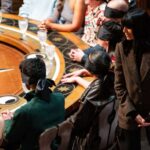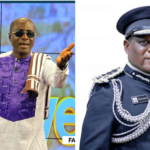Advocates in Egypt working to end Female Genital Mutilation
Georgi Wahba, a 53-year-old advocate from the Minya Governorate of Upper Egypt, is leading the charge against the prevalent practice of female genital mutilation in the country. Despite being outlawed, an alarming 86% of ever-married women in Egypt have undergone some form of the procedure, skyrocketing to 96% in Upper Egypt.
Through UNFPA’s ‘Generation Dialogues’ project, Wahba conducts awareness-raising sessions with families, couples, and communities to challenge the deeply-rooted tradition. By bridging the gap between generations and shifting perspectives on harmful practices, the project aims to empower communities to become agents of change.
Creating Dialogue Champions
To break through the taboos surrounding the topic, Wahba ensures that the learning experience is engaging and inclusive. By bringing together entire families and offering training on communication about harmful practices, over 350 community members have become “Dialogue Champions” since the project’s launch in 2021.
Wahba emphasizes the importance of allowing individuals to come to their own conclusions based on facts rather than simply agreeing with him. He patiently encourages community members to think critically and not blindly follow the customs they have grown up with.
Now a trusted voice in his community, Wahba is actively contacted by neighbors who fear someone is at risk of undergoing female genital mutilation. This progress gives him hope for the future, as he sees a growing awareness and understanding of the issue within his community.
Men Taking a Stand
While female genital mutilation is often viewed as a patriarchal norm, men from practicing communities are equally likely to oppose it. Fathers, in particular, play a crucial role in advocating for the elimination of the harmful practice.
Zanaty El-Sawy, a father from the Asyut Governorate, embarked on a journey to educate himself about female genital mutilation after realizing the impact it has on women and girls. Attending workshops led by UNFPA and Care, El-Sawy learned about the lack of religious or medical basis for the practice and became a vocal ally in the fight against it.
Through specially designed workshops that engage men and boys on topics like self-image, gender dynamics, and violence, El-Sawy now feels compelled to share his knowledge and engage his peers in discussions about women’s rights.
“Women have rights just like men – they should have a say just like men.”
Distributed by APO Group on behalf of United Nations Population Fund (UNFPA).








